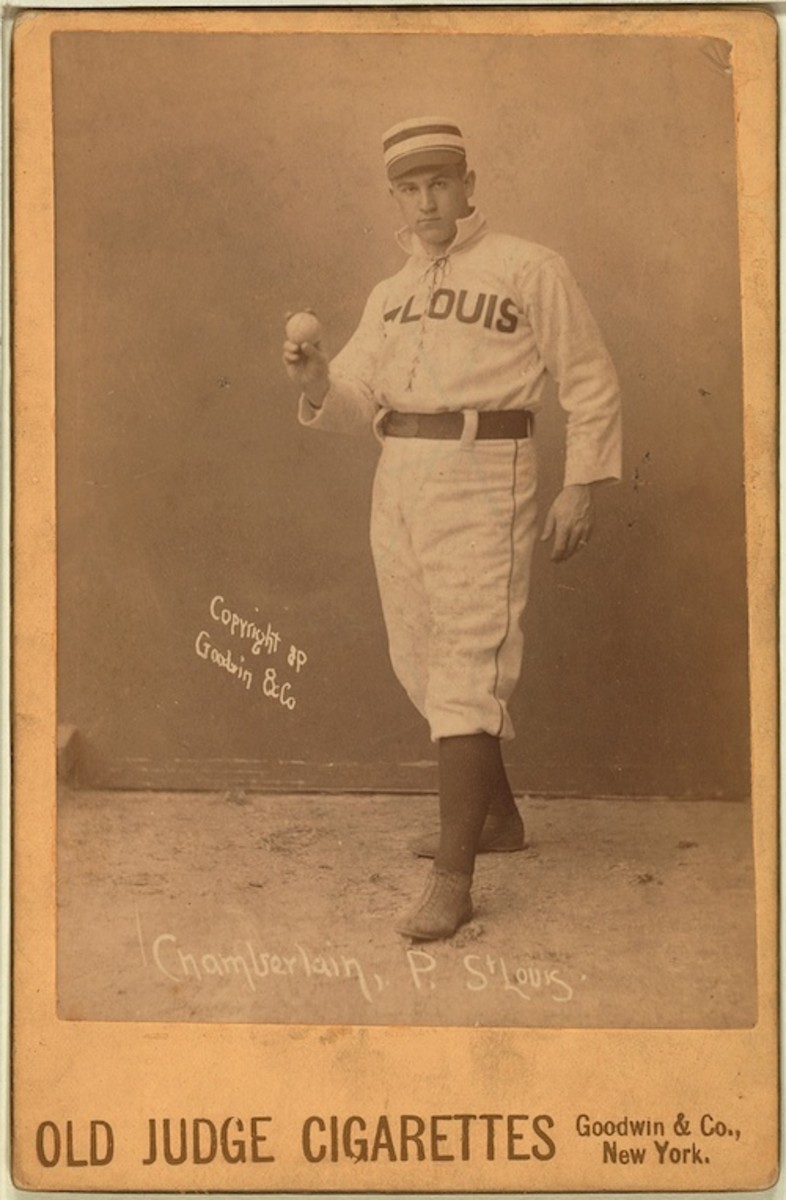Dead Dead Ball Ballplayer of the Week: Ice Box Chamberlain

This is Extra Mustard’s Dead Dead Ball Ballplayer of the Week, a new feature we’ll have on Thursdays to help you get through the baseball off-season.
Previously: Brickyard Kennedy

Ice Box Chamberlain pitched sometimes with both hands, and somehow that’s like the fifth-most interesting thing about him. Although, knocking out a teammate with a mallet in a bar fight is tough to top.
Chamberlain was born in a tiny Western New York town called Warsaw and moved to Buffalo as a kid. His given name was Elton but newspapers called him “Ice Box,” “Icebox” or sometimes “Iceberg.” His Society of American Baseball Research biography offers two explanations for the chilly nicknames.
Baseball historian Lee Allen said it was a nod to Chamberlain’s “austere calm in the face of all hostility by the enemy.”
Charles Comiskey, who played with Chamberlain for the St. Louis Browns and later went on to own the White Sox, gave a more dramatic origin story.
“Elton Chamberlain is the coolest pitcher in the profession. The captain is authority for the statement that whenever Chamberlain perspires his shirt freezes to his skin and he has to take a warm bath before he can get it off.”
When Chamberlain joined the Hamilton Clippers of the five-team Canadian League in 1885 he was just 17, and went 18–8 in his first pro season, before jumping to the Macon club in the Southern League in 1886. He went 13–20 before being snatched up later that season by the Louisville Colonels in the American Association, then considered a major league. It was with the Colonels in 1888 that Chamberlain pitched two innings left-handed during a blowout win over the Kansas City Cowboys.
In Chamberlain’s day, pitchers threw until their arms nearly fell off. But Ice Box was a man ahead of his time and realized that maybe this wasn’t the best strategy. In 1889, according to a book by Daniel Merle Pearson, Chamberlain repeatedly complained of a tired arm and questioned why first baseman/manager Charlie Comiskey didn’t have rookie Jack Stivetts pitch more.
Ice Box was a pretty good pitcher, but he holds one very embarrassing record. It was May 1894, Chamberlain was pitching for the Cincinnati Reds against the Boston Beaneaters. The game was played at the Congress Street Grounds because the Beaneaters’ usual home field, the South End Grounds, burned down during a game. (It was either started by a fan smoking a cigar or “some small [local] boys” committing arson. The resulting blaze destroyed 200 buildings in a 12-acre area,)
The leftfield wall Congress Street Grounds was only 250 feet from home plate, which is partially why Boston’s Bobby Lowe was able to hit four home runs, all of them off Chamberlain.
Anyway, about that bar fight. Apparently former Reds outfielder Jocko Halligan was fond of getting in fights when he drank. Here’s how Chamberlain’s SABR bio recounts the time Halligan tried to fight Ice Box:
“One night [Halligan] thrashed one player and then spotted another potential victim sitting at the bar. Jocko was unaware that Elton was watching his approach in the large mirror behind the bar. Just as Halligan was about to attack, the pitcher wheeled and flattened him with a bar mallet.”
Chamberlain’s career was a tumultuous one. Over 10 major-leauge seasons he pitched for six different teams and was out of the game by the time he was 28. Chamberlain wasn’t ready to give up the game, though. A 1900 issue of Sporting Life (“A weekly journal devoted to base ball, trap shooting and general sports”) reported that Ice Box was making a comeback.
“He has cut out all forms of dissipation and declares that in the future he will be found doing nothing but tending to business,” the article read. “The ‘Iceberg’ told me a day or two ago that his arm is good and that he is confident that he can put up just as good an article of pitcher as he ever could.”
The comeback never came to fruition, though. Ice Box disappeared from the public eye until he died of colon cancer in Baltimore at age 61.
